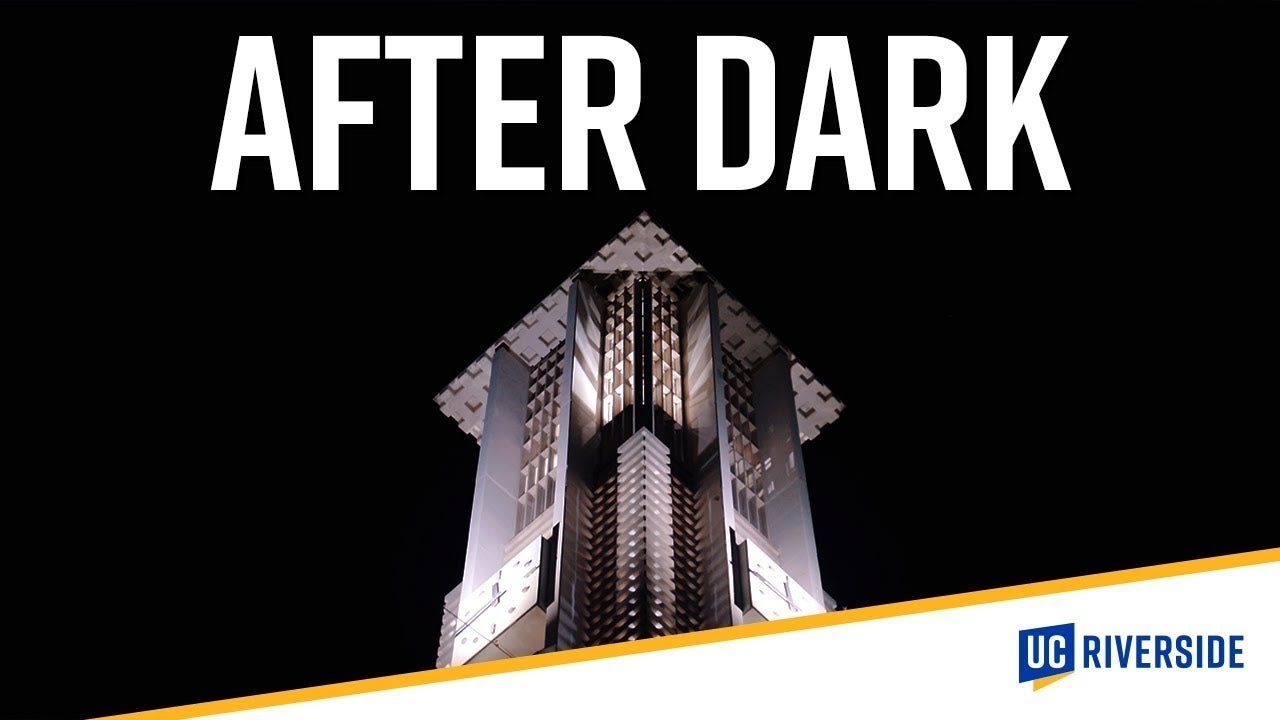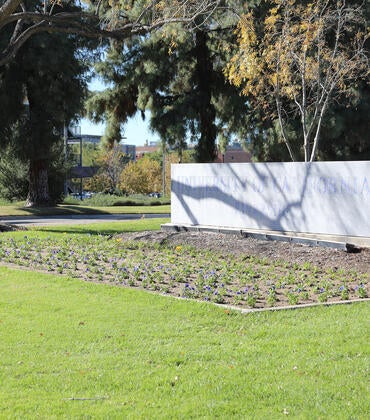At night, UC Riverside’s campus looks different as the daytime hustle and bustle gives way to a quiet stillness. But behind the scenes, a busy group of employees is responsible for keeping vital operations running.
The overnight shift includes police officers patrolling the campus, custodial crews cleaning buildings, and Dining Services employees cooking and baking before dawn at the student residential restaurants.
Facilities Services has one of the largest night shifts with about 80 employees working a variety of jobs on a typical night. The custodial staff is responsible for maintaining 3.2 million square feet of floor space in 90 academic buildings.
Salvador Cardenas, a custodial supervisor, oversees a specialized six-person floor care team who work nights and weekends deep cleaning carpets and waxing floors.
The crews – split into those that work Sunday through Thursday and those working Tuesday through Saturday – methodically clean one building at a time before moving onto the next. Some like the Tomás Rivera Library take a month to clean while others take a few weeks. It takes them two years to cover the entire campus at which point they start all over again.
On a late October night, the crew was working in Olmsted Hall, cleaning the floors.
Cardenas, who worked at UCLA for 15 years, joined UCR in February 2020 and has worked a night shift the entire time. He starts each night with a cup of coffee his wife has ready for him as he goes out the door.
“I’m used to it,” he said of the hours. “I think I work better at night.”
Aaron Uresti, assistant director of custodial services and resource management for Facilities Services, said the crew’s work is specialized. It involves knowing how to strip and lay wax evenly, accounting for the different types of tiles and materials in buildings of varying age.
“It is in a way an art form, especially when it comes to waxing the floors,” he said.
Newer buildings that have polished concrete get a deep cleaning, all part of the preventative maintenance to extend the life of campus facilities.
George Montes, a zone mechanic who works closely with Cardenas’ team, used to work a day shift but switched to nights as that allowed him to interact directly with the Facilities Services crews. He is responsible for fixing custodial equipment, which includes everything from vacuum cleaners to the soap and paper towel dispensers. He’s responsible for maintaining about 2,500 dispensers in about 500 restrooms.
On this particular night, Montes brought a floor scrubbing machine to Cardenas’ crew that has been upgraded with new brush plates, a new battery, and an aluminum handle. Montes said he always has several projects going at once in his workshop.
While the campus is quieter at night, Montes said there’s always activity such as students studying or researchers in their labs.
“It never stops,” Montes said. “The campus never sleeps.”
The Central Plant is one of the facilities that is running 24 hours a day, seven days a week with two operators at all times responsible for monitoring the four steam boilers and eight chillers that connect to several core campus buildings. The plant provides steam, compressed air, and vacuum to those buildings.
Plant operators Ricardo Rodriguez and Rudy Hernandez, who work the night shift, monitor readings from the plant control room. During their shift, they take readings, start up chillers, and remotely open valves.
Rodriguez said the night shift works out for him because he takes classes in the day. Four years in the U.S. Navy got him used to working odd shifts, he said.
For street sweeper Ricky Salinas nights are the best time for him to clean the mostly vacant campus roads and parking lots. He drives his Pelican street sweeper truck across campus at about five miles an hour. Three brushes underneath scrub the pavement while a vacuum in the middle sucks up trash and debris.
Salinas enjoys seeing the campus at night, noting that he’s spotted racoons, donkeys, coyotes, and wildcats roaming around. His supervisor Louie Garcia describes Salinas as the eyes for campus at night, letting him know in the morning of any problems he notices such as a downed tree branch or building that needs to be checked on. If he sees anything suspicious like a broken window, he’ll alert police.
Salinas, who has been with UCR since 2017, began working as a street sweeper operator in 2018. He likes the shift because he can spend more time with his daughter during the daytime.
“I like just the routine of it,” he said. “I come into work, do my job, I keep the campus clean. Before you know it, your shift is done.”




